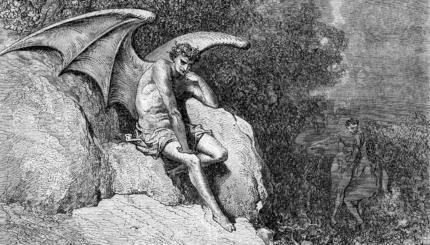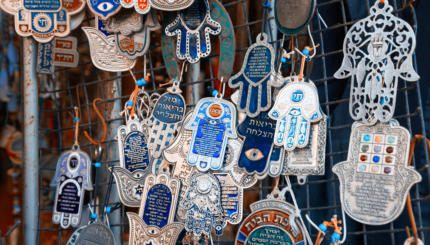Demons are supernatural, malevolent beings with the power to cause hurt to humans. Belief in demons, though not very pronounced in Jewish life and thought, is still prevalent, in a semi-comical way, at the level of folklore. Even some of the learned feel compelled to accept, perhaps not too seriously, belief in demons because this belief is implied in the Talmud in many places.
The Babylonian Talmud, in particular, produced against a Zoroastrian background in which the belief was strongly rooted, contains stories of visitations by demons and spells to ward them off.There is even a report of a rabbi conversing with a demon prince.
It is completely unhistorical to maintain, as did Krochmal, that all these references were inserted into the Talmud by ignorant copyists or by those influenced by folk-beliefs said to have been repudiated by the rabbis themselves.
Medieval Rationalists
Some of the medieval thinkers accepted the belief in demons. Others rejected the belief as contrary to the doctrine of divine providence. Why should God have surrendered His control of the universe, on some occasions, into the power of such creatures?
Abraham Ibn Ezra rejects entirely the notion that demons really exist. Maimonides either ignores the talmudic references to demons or gives these a rationalistic explanation; as, for example, when he understands the mishnaic reference to an ‘evil spirit’ against which a light can be put out even on the Sabbath, to mean a spirit of melancholy.
Menahem Meiri generally follows a similar demythologizing tendency when he understands the talmudic reference to warding off the demons by reciting the Shema before retiring as meaning that evil thoughts invade the mind at bedtime and these can successfully be dispelled through the recitation of the Shema. Meiri also understands the talmudic reference to Joseph the demon, who was able to traverse great distances through the air, to mean that there was a skilled acrobat who could vault over great distances and who was known as ‘Joseph the devil’ in the sense that he was a devil-may-care character.
From the Kabbalah
The Kabbalah has a vast demonology of its own. The demonic powers constitute an unholy parody of the sacred realms against which they are in constant battle.In a very revealing illustration, the Zohar compares the “Other Side,” the domain of the evil powers, to a vicious dog held by its owner on a long lead. The dog, though it appears to enjoy independent power, is pulled back whenever it is in danger of getting out of control.
Under the influence of the Kabbalah, especially, belief in the existence of demons became widespread. Although there is no official Jewish rite of exorcism, there are numerous tales of saintly men exorcising demons from houses and persons.
Belief in demons is thus generally present but very peripheral in the Jewish scheme. No representative thinker, for instance, ever thought of dubbing Ibn Ezra a heretic because he refused to believe in demons. Needless to say, sophisticated Jewish thinkers who did believe in the existence of demons did not think of these as little devils with forked tails breathing fire but as spiritual forces which God has unleashed in the world for purposes of His own, or as harmful psychological processes which take place in the human mind.
Reprinted from The Jewish Religion: A Companion, published by Oxford University Press.
Kabbalah
Pronounced: kah-bah-LAH, sometimes kuh-BAHL-uh, Origin: Hebrew, Jewish mysticism.
Shema
Pronounced: shuh-MAH or SHMAH, Alternate Spellings: Sh’ma, Shma, Origin: Hebrew, the central prayer of Judaism, proclaiming God is one.
Talmud
Pronounced: TALL-mud, Origin: Hebrew, the set of teachings and commentaries on the Torah that form the basis for Jewish law. Comprised of the Mishnah and the Gemara, it contains the opinions of thousands of rabbis from different periods in Jewish history.
Zohar
Pronounced: ZOE-har, Origin: Aramaic, a Torah commentary and foundational text of Jewish mysticism.


